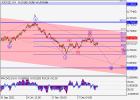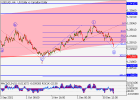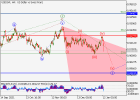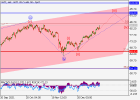Key Releases
United States of America
USD strengthens against JPY, has ambiguous dynamics against EUR, and is weakening against GBP.
Investors continue to discuss yesterday's comments by the head of the US Federal Reserve, Jerome Powell, before the Senate Committee on Banking, Housing, and Urban Affairs. In general, he did not say anything fundamentally new to the market and limited himself to confirming the regulator's plans, which had already been outlined earlier. Powell said that if the current economic situation persisted, the department would begin to normalize monetary policy. In March, the purchase of assets will be stopped, then an increase in rates and a reduction in the balance sheet will begin. The official also noted that the US economy no longer needs the support measures provided to it in connection with the pandemic, and therefore tightening of monetary policy is inevitable. However, there is still a long way before its final normalization. The December data on inflation in the country were published today, which recorded a further increase in the indicator. The CPI rose from 6.8% to 7.0% YoY, confirming experts' calculations, and the core CPI increased from 4.9% to 5.5% instead of the expected 5.4%. A further rise in prices strengthens investors' confidence that the US Federal Reserve will not back down from tightening monetary policy.
Eurozone
EUR is weakening against GBP and has ambiguous performance against JPY and USD.
Published today, November data on the volume of industrial production in the Eurozone countries were ambiguous. Production rose by 2.3% MoM, beating the 0.5% expected but declined by 1.5% YoY instead of the expected 0.6% increase. The German wholesale price index data for December recorded a slowdown in the growth. The indicator decreased from 1.3% to 0.2% MoM and from 16.6% to 16.1% YoY. Nevertheless, inflationary pressures in the German and generally European economies remain high. Today, the German Trade Association (BGA) warned of the possibility of new massive supply chain disruptions due to the rapid spread of the omicron coronavirus variant, but a long-term supply chain collapse is considered unlikely.
United Kingdom
GBP is strengthening against its main competitors – JPY, EUR, and USD.
Due to a lack of significant economic news, politics has become the focus of investors' attention. Today, British Prime Minister Boris Johnson officially admitted that he had attended a party with the participation of members of the government in May 2020 and thereby violated the quarantine rules in force at the time. Johnson apologized to the citizens and noted that he considered the event a working meeting, which required his presence. Labor Party members will accuse Johnson of cheating, and many experts believe the scandal could cost him his prime minister seat. Dissatisfaction with Johnson has been brewing for a long time, including among conservatives. He is accused of the inability to maximize the benefits of Brexit, unreasonable tax hikes, and insufficient activity in leveling economic conditions between different parts of the country. If Boris Johnson resigns, the UK will face a period of political uncertainty, which could negatively affect the position of GBP.
Japan
JPY is weakening against its main competitors – GBP, USD, and EUR.
Investors are focused on today's Bank of Japan's quarterly report on the regional economy. For the first time since October 2013, the regulator revised the estimates for all regions upward compared to the previous October economic report. The document says the impact of the coronavirus pandemic is waning, and Japan's economy continues to grow, especially in the private sector. However, the risks associated with the Omicron strain remain. Officials admitted that some regions remain in dire straits, but the overall economy is gradually recovering in all country regions. The Bank of Japan's optimistic assessment of the state of the economy increases the likelihood that the regulator will revise its forecasts for GDP growth and inflation for the current year upward.
Australia
AUD is strengthening against its main competitors – EUR, JPY, GBP, and USD.
AUD is growing despite the worsening epidemiological situation in the country. The daily number of sick citizens remains at record levels, putting serious pressure on the health care system, but the government is not introducing additional quarantine measures. The continued deterioration of the situation may negatively affect the Australian economy as a whole and, above all, slow down the service sector's recovery. The virus is currently scaring away customers of the airlines, entertainment, and hospitality sectors, which have already suffered from several blockages in the past two years.
Oil
Oil quotes continue to rise.
The API report published yesterday recorded a decline in US oil reserves by 1.077M barrels, slightly less than the expected volume of 1.950M barrels. Nevertheless, the decline has been going on for seven weeks in a row, which speaks of the sustainability of demand for "black gold" despite the Omicron pandemic. Investors are awaiting the release of a similar report from the EIA today. Oil reserves are expected to decline by 1.904M barrels. Implementation of the forecast may support the oil market.































